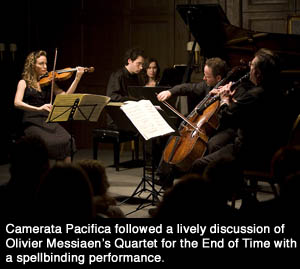Time without Boundaries
Camerata Pacifica's March concert. At Lotte Lehmann Hall, Friday, March 16.

Camerata Pacifica pushed the programming envelope on Friday by putting the intermission before the first piece. The audience heard 20 minutes of discussion and demonstration from the massed players about the evening’s featured work, Olivier Messiaen’s Quartet for the End of Time, then adjourned for 15 minutes before returning to listen to Bach’s A Minor Partita for Solo Flute, BWV 101, followed by the Messiaen, back-to-back. If that sounds odd, well, it was, but Adrian Spence and his affable, highly informed gang of virtuosi made it work. The opening discussion alone, with fascinating remarks from clarinetist Bil Jackson about the role of the piece in the clarinet repertoire, and a demonstration and lively description of some of the more idiosyncratic aspects of Messiaen’s compositional practice from pianist Shai Wosner, was well worth having attended.
Thanks to the early interval, during the second part of the evening there was nothing to think about but the music itself. Spence’s Bach flute solo came first and had a lonely, almost existential effect in this context. Performances of the rare and challenging Quartet for the End of Time tend to carry with them one’s imagination of the scene of the work’s composition and first performance: Stalag VIII-A, a Nazi prisoner of war camp on the border between Germany and Poland. In May 1940, Messiaen was taken prisoner while serving in the French army. He and a group of fellow prisoners obtained permission to compose, rehearse, and perform an original piece of music. The premiere performance of the Quartet for the End of Time thus took place in the freezing cold January of 1941, for an audience of prisoners of war and Nazi guards. Each of its eight sections is keyed to an aspect of Christian doctrine, but the Apocalypse is only one way in which the title refers to the “end of time.” The piece is saturated with innovative compositional techniques designed to create the sensation of a time without boundaries. The finale is a long violin solo through which Messiaen evokes the ascension of Christ. Catherine Leonard played this highly exposed part with consummate artistry and feeling, leaving the room silent and spellbound as the final, nearly inaudible notes decayed.



